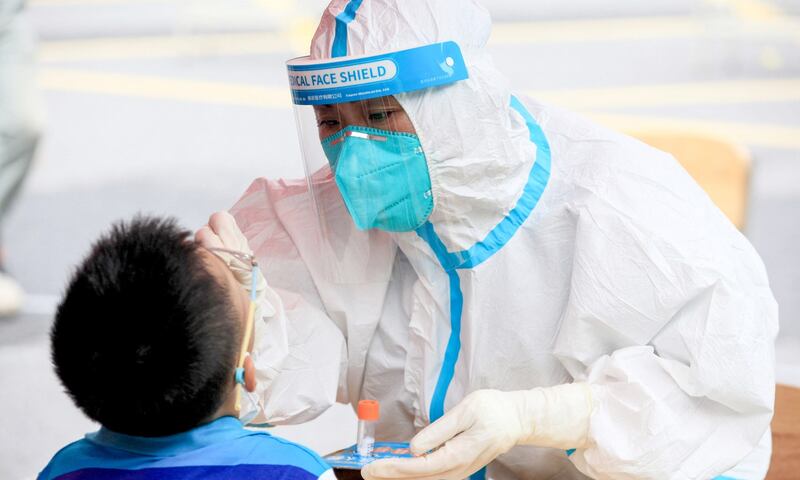Millions of people in the eastern Chinese city of Nanjing were under partial lockdown on Thursday as the authorities scrambled to contain an outbreak of the Delta coronavirus variant in the city.
Health authorities said that, as of Thursday, the city had seen 153 confirmed cases of COVID-19 linked to a cluster at Nanjing Lukou International Airport first discovered on July 20, and many more expected to be confirmed in a new wave of Delta variant infections.
Cases have been detected among airport workers, university dormitory administrators, teachers, and taxi drivers, official media reported.
The ruling Chinese Communist Party (CCP)'s central commission for discipline inspection has publicly criticized the airport management, accusing it of "unprofessional management" and a lack of supervision.
"A number of infection prevention measures weren't implemented in detail," it said in a statement on its website on July 28.
"The early confirmed cases of this round of the epidemic were mainly found among ground staff and aircraft cleaning teams, which were outsourced to the Nanjing Lukou Airport Cleaning Co.," the statement said.
"The airport did not separate the cleaning personnel responsible for cleaning domestic flights from those cleaning international flights, and routine supervision was seriously lacking," it said.
It said the failure to separate processes for international and domestic passengers extended across all of the airport's operations.
Nanjing health officials are now gearing up for another round of citywide testing, covering the entire population of nine million residents for the third time since the start of the airport outbreak.
Nanjing under lockdown
The Delta strain of coronavirus found in Nanjing has since spread to six provinces and 12 cities elsewhere in China, including Anhui, Guangdong, Hunan, and Sichuan, and authorities have pretty much sealed off the city from the rest of the world, as cases continue to rise, residents told RFA.
"The current situation in Nanjing is basically a lockdown," Nanjing-based student Zhou Ning told RFA.
"Transportation links have been cut off to the whole city, because there are many places here that are now medium and high-risk areas," Zhou said.
"All of the medium- and high-risk residential communities are closed, and people are being forced to stay home," he said. "They cut off Lukou airport as soon as the outbreak started."
Long-distance rail and bus stations, karaoke, and other nightspots and gyms have all been ordered to close.
Nobody is being allowed to leave the city without a health code, which essentially requires a recent, negative PCR test.

Vaccine concerns
But concerns over the efficacy of Chinese-made vaccines against Delta remain, according to Zhang Jianping, who lives in Yixing, Jiangsu province, of which Nanjing is the capital.
"More than 2,700 people from surrounding areas, including Yixing, had been in Nanjing Airport around the time the outbreak started," Zhang said.
"This tells us two things: the first is that the disease prevention response in China is very fast, and the second is that there is a problem with our vaccines."
"Most people who have been vaccinated are still getting infected," Zhang said.
More affected areas
Since the Lukou Airport outbreak, the Delta variant has been detected in Dalian and Shenyang in the northeastern province of Liaoning, in Maanshan and Wuhu in the eastern province of Anhui, in Zhongshan and Zhuhai in the southern province of Guangdong, in Mianyang and Chengdu in the southwestern province of Sichuan, in Suqian and Yangzhou in Jiangsu, and in Changde in the central province of Hunan.
According to China News, close contacts of known cases have also been found in Taizhou city, in the eastern province of Zhejiang, with one infected person from Dalian traveling to the popular tourist spot of Zhangjiajie, passing through the northern city of Xi'an along the way.
The Changde City Health Commission reported on July 28 that one case of asymptomatic infection was detected in the city's Wuling district, following contact with a confirmed case in Chengdu.
A resident of Anhui surnamed Wu said Chinese-made vaccines are fairly ineffective against the Delta variant.
"The body can't make antibodies to fight this strain after receiving [Chinese-made] vaccines," Wu said. "What is needed is a booster shot of Pfizer vaccine, and I heard they will start administering these soon."
"Without them, things will only get worse."
Chinese state media quoted Hu Shanlian, a professor at the School of Public Health at Shanghai's Fudan University, as saying that one person infected with the Delta variant can infect between 5 to 8 others, often different generations.
Translated and edited by Luisetta Mudie.
